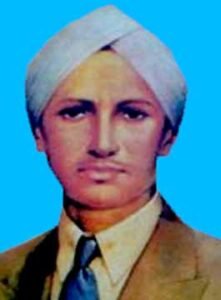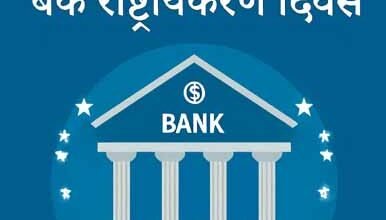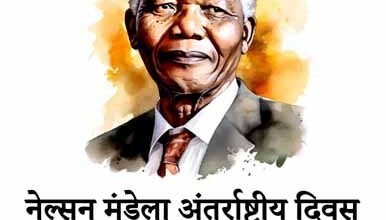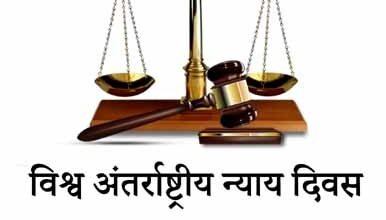
करतार सिंह…
स्वत: 15 अगस्त, 1947 को करीब 200 सालों के ब्रिटिश शासन को समाप्त करते हुए, देश को आज़ादी मिली। यह सभी भारतीयों के लिए बेहद गर्व का दिन है क्योंकि हम उन लाखों स्वतंत्रता सेनानियों के बलिदान को याद करते हैं जिन्होंने स्वतंत्रता के संघर्ष में अपने प्राण न्यौछावर कर दिए। उनकी अटूट देशभक्ति ने ब्रिटिश साम्राज्य को देश छोड़ने के लिए मजबूर कर दिया। आज भी हम महात्मा गांधी, चंद्र शेखर आज़ाद, भगत सिंह, सुभाष चंद्र बोस, लाला लाजपत राय और कई अन्य प्रमुख स्वतंत्रता सेनानियों के बारे में जानते हैं, पर ऐसे कई गुमनाम नायक हैं जिन्होंने देश के लिए सर्वोच्च बलिदान दिया।ऐसे ही एक गुमनाम देशभक्त हैं करतार सिंह सराभा, जिन्होंने 19 साल की छोटी उम्र में अपने प्राणों की आहुति दे दी। करतार सिंह सराभा भगत सिंह समेत कई स्वतंत्रता सेनानियों के लिए प्रेरणा बने, और भगत सिंह तो इन्हें अपना “गुरु” व आदर्श मानते थे। लाहौर षडयंत्र मामले में सराभा और 27 अन्य क्रांतिकारियों पर आरोप लगाया गया और उन पर मुकदमा चलाकर उन्हें फांसी की सजा दे दी गईशहीद करतार सिंह का जन्म 24 मई, 1896 को लुधियाना के सराभा नगर में एक जाट सिख परिवार में हुआ था। करतार सिंह ने अपने पिता को बचपन में ही खो दिया था और उनका पालन-पोषण उनके दादा ने किया था। करतार ने अपनी प्राथमिक शिक्षा गांव के स्कूल से और मैट्रिक की पढ़ाई मिशन हाईस्कूल से पूरी की। 16 साल की उम्र में, उनके दादाजी ने उन्हें कैलिफोर्निया विश्वविद्यालय, बर्कले में केमेस्ट्री की पढ़ाई करने के लिए भेज दिया।सैन फ्रांसिस्को पहुंचने पर, एक घटना ने करतार सिंह पर गहरा प्रभाव डाला। उन्होंने भारतीयों के साथ अपमानजनक व्यवहार देखा, वहां उन्हें भारतीयों को “गुलाम” कहा जाता था और उनके साथ दोयम दर्जे का व्यवहार किया जाता था। वह बर्कले में भारतीय छात्रों के नालंदा क्लब में शामिल हो गए और भारतीय अप्रवासियों, विशेषकर श्रमिकों के साथ दुर्व्यवहार से कोध्रित हो गए और अंग्रेजों के खिलाफ मोर्चा खोल दिया। पढ़ाई के दौरान वह गदर आंदोलन के प्रमुख सदस्य बने, जिसका उद्देश्य देश को ब्रिटिश शासन से आजाद कराना था। गदर पार्टी का गठन 21 अप्रैल, 1913 को ओरेगॉन में किया गया था, जिसके प्रभारी करतार सिंह गदर अखबार के पंजाबी संस्करण के प्रभारी थे। अखबार ने ब्रिटिश अत्याचारों को उजागर किया और प्रवासी भारतीयों में क्रांतिकारी विचारों को बढ़ावा दिया। बाद में, करतार सिंह भारत लौट आए और अन्य युवा क्रांतिकारियों के साथ मिलकर कोलकाता में जतिन मुखर्जी से मिले। मुखर्जी ने उन्हें रासबिहारी बोस से जोड़ा और उन्होंने पंजाब में क्रांति की योजना बनाई। अंग्रेजों को उनकी योजनाओं के बारे में पता लगने के बाद करतार सिंह के पीछे पड़ गए। इस दौरान अंग्रेजों ने कई गदरवादियों को गिरफ्तार किया इसके बावजूद उन्होंने अपने प्रयास जारी रखे।21 फरवरी, 1915 को करतार सिंह और वरिष्ठ नेताओं ने छावनियों पर हमला करने का प्लान बनाया, लेकिन एक उनके ही एक गद्दार साथी ने अंग्रेजों को पहले ही इसकी जानकारी दे दी, जिसके बाद कई गिरफ्तारियां हुईं। करतार सिंह कैद से बच निकले, पर 2 मार्च, 1915 को भारतीय सैनिकों को विद्रोह के लिए उकसाने की कोशिश करते हुए गिरफ्तार कर लिए गए। उन्हें लाहौर षडयंत्र मामले में अन्य गदरवादियों के साथ मुकदमे का सामना करना पड़ा। सलाह दिए जाने के बावजूद, 19 वर्षीय शहीद ने मुकदमे के दौरान अपना बचाव करने का फैसला नहीं किया। जज ने कहा कि सिंह को अपने द्वारा किए गए कार्यों पर बहुत गर्व था और उसने कोई पछतावा नहीं दिखाया, उसे “सभी विद्रोहियों में सबसे खतरनाक” माना जाए। इसके बाद उन्हें मृत्यु तक फांसी की सज़ा सुना दी गई। 16 नवंबर, 1915 को करतार सिंह सराभा एक मुस्कान, आंखों में चमक और अपने द्वारा रचित देशभक्ति के गीत गाते हुए फांसी पर चढ़ गए।
========== ========== ===========
Kartar Singh…
 On August 15, 1947, the country got independence, ending nearly 200 years of British rule. It is a day of immense pride for all Indians as we remember the sacrifices of lakhs of freedom fighters who laid down their lives in the struggle for freedom. His unwavering patriotism forced the British Empire to leave the country. Even today we know about prominent freedom fighters like Mahatma Gandhi, Chandra Shekhar Azad, Bhagat Singh, Subhash Chandra Bose, Lala Lajpat Rai, and many more, but there are many unsung heroes who made the supreme sacrifice for the country. One such unsung patriot is Kartar Singh Sarabha, who laid down his life at the tender age of 19. Kartar Singh Sarabha became an inspiration to many freedom fighters including Bhagat Singh, and Bhagat Singh considered him his “guru” and ideal. Sarabha and 27 other revolutionaries were accused in the Lahore Conspiracy Case and tried and sentenced to death. Martyr Kartar Singh was born on May 24, 1896, in Sarabha Nagar, Ludhiana in a Jat Sikh family. Kartar Singh lost his father in his childhood and was brought up by his grandfather. Kartar completed his primary education from the village school and matriculation from the Mission High School. At the age of 16, his grandfather sent him to study chemistry at the University of California, Berkeley. On reaching San Francisco, an incident made a deep impression on Kartar Singh. He witnessed the humiliating treatment of Indians, where they were called “slaves” and treated with a secondary status. He joined the Nalanda Club of Indian students at Berkeley and was incensed by the treatment of Indian immigrants, especially laborers, and opened a front against the British. During his studies, he became a prominent member of the Gadar movement, which aimed to liberate the country from British rule. The Ghadar Party was formed on April 21, 1913, in Oregon, with Kartar Singh in charge of the Punjabi edition of the Ghadar newspaper. The newspaper exposed British atrocities and promoted revolutionary ideas among the diaspora. Later, Kartar Singh returned to India and along with other young revolutionaries met Jatin Mukherjee in Kolkata. Mukherjee connected him with Rash Behari Bose and they planned a revolution in Punjab. The British went after Kartar Singh after they came to know about his plans. During this, the British arrested many Gadarists, yet they continued their efforts. On February 21, 1915, Kartar Singh and senior leaders made a plan to attack the cantonments, but one of his own traitors had already informed the British about this. Gave it, after which many arrests took place. Kartar Singh escaped captivity but was arrested on March 2, 1915, for trying to incite Indian soldiers to mutiny. He faced trial along with other Ghadarites in the Lahore Conspiracy Case. Despite being advised, the 19-year-old Shaheed chose not to defend himself during the trial. The judge noted that Singh was very proud of what he had done and showed no remorse, considering him “the most dangerous of all rebels”. After this, he was sentenced to be hanged to death. On November 16, 1915, Kartar Singh Sarabha went to the gallows with a smile, a twinkle in his eye, and singing patriotic songs composed by himself.
On August 15, 1947, the country got independence, ending nearly 200 years of British rule. It is a day of immense pride for all Indians as we remember the sacrifices of lakhs of freedom fighters who laid down their lives in the struggle for freedom. His unwavering patriotism forced the British Empire to leave the country. Even today we know about prominent freedom fighters like Mahatma Gandhi, Chandra Shekhar Azad, Bhagat Singh, Subhash Chandra Bose, Lala Lajpat Rai, and many more, but there are many unsung heroes who made the supreme sacrifice for the country. One such unsung patriot is Kartar Singh Sarabha, who laid down his life at the tender age of 19. Kartar Singh Sarabha became an inspiration to many freedom fighters including Bhagat Singh, and Bhagat Singh considered him his “guru” and ideal. Sarabha and 27 other revolutionaries were accused in the Lahore Conspiracy Case and tried and sentenced to death. Martyr Kartar Singh was born on May 24, 1896, in Sarabha Nagar, Ludhiana in a Jat Sikh family. Kartar Singh lost his father in his childhood and was brought up by his grandfather. Kartar completed his primary education from the village school and matriculation from the Mission High School. At the age of 16, his grandfather sent him to study chemistry at the University of California, Berkeley. On reaching San Francisco, an incident made a deep impression on Kartar Singh. He witnessed the humiliating treatment of Indians, where they were called “slaves” and treated with a secondary status. He joined the Nalanda Club of Indian students at Berkeley and was incensed by the treatment of Indian immigrants, especially laborers, and opened a front against the British. During his studies, he became a prominent member of the Gadar movement, which aimed to liberate the country from British rule. The Ghadar Party was formed on April 21, 1913, in Oregon, with Kartar Singh in charge of the Punjabi edition of the Ghadar newspaper. The newspaper exposed British atrocities and promoted revolutionary ideas among the diaspora. Later, Kartar Singh returned to India and along with other young revolutionaries met Jatin Mukherjee in Kolkata. Mukherjee connected him with Rash Behari Bose and they planned a revolution in Punjab. The British went after Kartar Singh after they came to know about his plans. During this, the British arrested many Gadarists, yet they continued their efforts. On February 21, 1915, Kartar Singh and senior leaders made a plan to attack the cantonments, but one of his own traitors had already informed the British about this. Gave it, after which many arrests took place. Kartar Singh escaped captivity but was arrested on March 2, 1915, for trying to incite Indian soldiers to mutiny. He faced trial along with other Ghadarites in the Lahore Conspiracy Case. Despite being advised, the 19-year-old Shaheed chose not to defend himself during the trial. The judge noted that Singh was very proud of what he had done and showed no remorse, considering him “the most dangerous of all rebels”. After this, he was sentenced to be hanged to death. On November 16, 1915, Kartar Singh Sarabha went to the gallows with a smile, a twinkle in his eye, and singing patriotic songs composed by himself.





